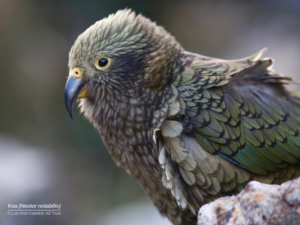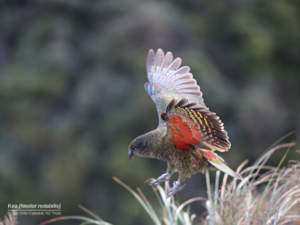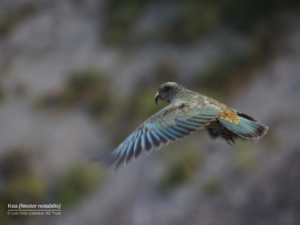
We think of parrots as tropical creatures, but there is one very unusual psittacine that lives on the ground in the alpine native forests of New Zealand, the kea parrot (Nestor notabilis). It is the only mountain parrot species in the world and is also considered to be one of the most intelligent birds on the planet! Keas are highly social and exhibit complex cognitive skills, which is why their intelligence is extensively studied at several universities.
The other unusual aspect of keas is that they nest on the ground in naturally formed cavities. Females care for the eggs while the male forages for the family. It takes four months for the chicks to fledge. So, like many parrot species, they are long-lived and slow to repopulate, making them more vulnerable over time. Keas have been known to live up to 50 years in captivity, and 30 years in the wild.
Protecting Keas
With the arrival of Europeans in New Zealand in the 19th century, keas were accused of attacking sheep and underwent significant culling. As many as 150,000 were killed in a legal bounty system. The current population is estimated at 5,000-6,000, in a limited 16,000-square-mile region. Today, the kea is listed as Endangered by IUCN, and did not receive full protection until 1986, so there’s lots of work to do!

The NZ Parrot Trust is working to increase and protect the kea population, along with several other government and non-profit organizations like the Kea Conservation Trust NZ. There are several important projects underway such as removing lethal lead nails, flashing, and paint in areas frequented by keas, who are naturally curious and known to chew on everything, even if just for fun!
Increased predator control has been initiated around nesting areas in key parks, and more medical care for rehabilitation is being funded at wildlife hospitals. Some keas are now tracked via VHF radio so we can learn more about their behavior, and known nests are being monitored for their breeding success. The goal is to build a stronger more sustainable population of keas!

Lafeber’s $500 GLOBAL PARROT conservation grant this month goes to NZ Parrot Trust to help support these many worthy projects. You can also help! Click here to learn more and to make a tax-deductible donation.
